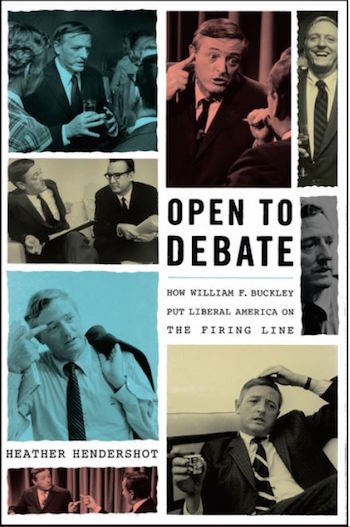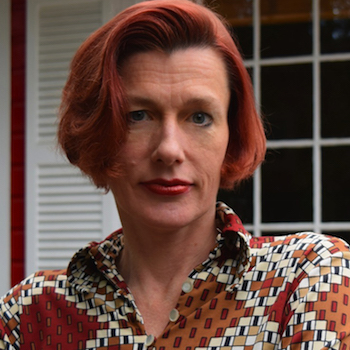Book Interview: William F. Buckley on TV’s “Firing Line” — “Open to Debate”
“Conservatism was his perspective, but William F. Buckley was really interested in having the other side on and having real discussions.”
Open to Debate: How William F. Buckley Put Liberal America on the Firing Line by Heather Hendershot. HarperCollins, 357 pp. $28.99 (hardcover)
By Blake Maddux

As the host of enduring public affairs television program Firing Line, journalist, author, and one-time New York City mayor candidate William F. Buckley Jr. literally and figuratively leaned to the right.
In doing so over the course of 1,504 episodes of a program that was initially contracted for 12, Buckley distanced himself from frightening right-wing extremists such as The John Birch Society and fashioned a more embraceable model for conservatism in the wake of Barry Goldwater’s landslide loss to President Lyndon Johnson in 1964.
In her new book Open to Debate: How William F. Buckley Put Liberal America on the Firing Line, Heather Hendershot explores Buckley’s 33-year tenure (1966–1999) on Firing Line as the lens through which to examine — as she called it in a recent phone interview — “America’s shift from left to right in the ‘60s to the ‘80s.”
Hendershot is a professor in the Comparative Media Studies & Writing department at MIT. In addition to Open to Debate, she is the author of Saturday Morning Censors: Television Regulation before the V-Chip (1998), Shaking the World for Jesus: Media and Conservative Evangelical Culture (2004), and What’s Fair on the Air?: Cold War Right-Wing Broadcasting and the Public Interest (2011).
In Open to Debate, Professor Hendershot examines how Buckley took on issues such as communism, civil rights, and women’s liberation with guests that included Noam Chomsky, Eldridge Cleaver, Margaret Thatcher, and the recently deceased Phyllis Schlafly.
Hendershot participated in the aforementioned talk with The Arts Fuse from her home office in Cambridge, MA.
Arts Fuse: What are some of the classes that you teach at MIT?

Author Heather Hendershot, a professor in the Comparative Media Studies & Writing department at MIT.
Heather Hendershot: I’m teaching this terrific science fiction class to MIT undergrads this semester. I’ve also taught silent film for undergraduates, which is kind of something to do with MIT because so much of silent film history is technical history. The history of the rise of color technology, eventually the rise of sound, standardization of film gauge, that kind of thing. So it’s actually kind of an interesting match for MIT students. And I run the graduate studies program in Comparative Media Studies, so I teach a number of core classes to grad students. Method classes, basically classes that help them write their proposals for their master’s theses. So that’s basically what I do in the classroom.
AF: Why did you decide to delve so deeply into the television career of William F. Buckley Jr.?
Hendershot: He had been such an interesting bit player in What’s Fair on the Air? that I realized, this guy needs to be the star of his own book. And I got really intrigued with him and started watching all of his shows. Firing Line was so smart and gracious and engaging. I disagreed with much of what Buckley said, but he had on these liberal and leftist guests and they would have these really intelligent, interesting conversations. It was programming that Buckley hoped would convert people to his side, but you couldn’t just say that this was just straight-up conservative programing. Conservatism was his perspective, but he was really interested in having the other side on and having real discussions.
AF: Did you watch every single episode of Firing Line in researching this book?
Hendershot: I watched many, many, many episodes of Firing Line! (laughs). I lost count. Some of them are not available, some of them you can put in a special request at the Hoover Institution [at Stanford University], pay them, and they’ll send you a copy. Many that are not available to watch are available by transcript, so I read many transcripts. That’s useful, but it cannot compare to watching the show. The personalities and the voices, the fashion — looking at Woodward and Bernstein in the early ’70s with these fabulous giant ties! And Buckley is like in this time capsule where he bought the same J. Press shirts at Yale in 1950 and seersucker jackets and doesn’t seem to change much in the 33 years that the show was on the air. There’s a lot going on visually there and it’s really important to watch the shows.
AF: Were any of your own political viewpoints affected by having watched as much of the show as you did?
Hendershot: I wouldn’t say that my positions changed in dramatic ways from watching the show. But my knowledge base for why I believed what I did, and my understanding of what the arguments were on the other side and what the strengths and weaknesses of those arguments were, that really expanded. The show gave me a really much more nuanced understanding of conservative perspectives than I had when I started the project.
AF: Did Buckley’s views on any major issues change over time?
Hendershot: Late in his life one reporter asked him, “Were you wrong about anything over the years?” He said yes, actually, I was wrong about civil rights. We really did need federal government intervention. This was not a problem that the states could or would fix on their own. Maybe they could, but they wouldn’t. So he realized that, and that was a pretty major thing for him to say because he had had a very strong states’ rights stand about civil rights on Firing Line and in his magazine and in his editorial column.
On the show he would have super right-wing anti–civil rights folks like Strom Thurmond and you would think they would agree about everything. Actually not, because many of the Southern politicians who said that this was all about states’ rights and the federal government can’t tell us what to do, we can deal with our own racial problems, we’ll fix it, we don’t need government, they said that, but that was backed up by extreme racism. Buckley believed the states’ rights angle, but he was not a racist underneath it all. He thought that racism was totally immoral and that segregation was immoral.

William F. Buckley
AF: Would Buckley, who died in 2008, disapprove of Donald Trump as the GOP nominee and the torchbearer of conservatism?
Hendershot: Absolutely. He would have had no tolerance for this person whatsoever. In fact, it’s not so speculative. He actually wrote an essay on Donald Trump in the year 2000 in Cigar Aficionado magazine. The article had a title something like, “The Demagogues are Coming,” or “Attack of the Demagogues.” I can’t remember, but it was about Trump as an outsider candidate, and also Jesse “The Body” Ventura. And he said these people are demagogues. Trump is not only a demagogue but a narcissist. It was just a totally firm absolute rejection of this fellow.
Blake Maddux is a freelance journalist who also contributes to The Somerville Times, DigBoston, Lynn Happens, and various Wicked Local publications on the North Shore. In 2013, he received an MLA from Harvard Extension School, which awarded him the Dean’s Prize for Outstanding Thesis in Journalism. A native Ohioan, he moved to Boston in 2002 and currently lives with his wife in Salem, Massachusetts.
